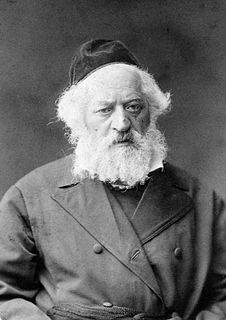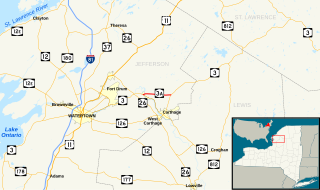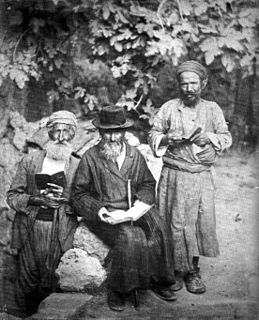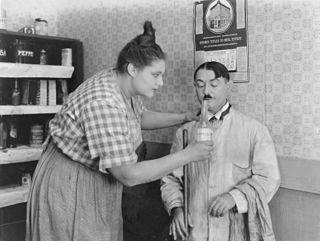New Yorker or variant may refer to:

Herrings is a hamlet and census-designated place (CDP) in Jefferson County, New York, United States. The population was 90 at the 2010 census, down from 129 at the 2000 census. The hamlet is named after two brothers who owned a paper mill in the area.

Natural Bridge is a hamlet and census-designated place (CDP) in Jefferson County, New York, United States. As of the 2010 census it had a population of 365.
New York most commonly refers to:

Yitzchak Elchanan Spektor was a Russian rabbi, Posek and Talmudic sage of the 19th century.

Solomon Buber was a Jewish Galician scholar and editor of Hebrew works. He is especially remembered for his editions of Midrash and other medieval Jewish manuscripts, and for the pioneering research surrounding those texts.

New York State Route 3A (NY 3A) is a county-maintained state highway in Jefferson County, New York, in the United States. The route is an alternate route of NY 3 between the village of Deferiet and Fargo, a hamlet within the town of Wilna. While NY 3 veers south to serve the village of Carthage, NY 3A follows a direct east–west alignment between the two communities. The eastern half of the route passes through the Fort Drum limits. All of NY 3A is co-designated as County Route 36 (CR 36) and is co-signed as such.

Jacob Saphir (1822–1886) was a Meshulach and traveler of Romanian Jewish descent, born in Ashmyany, government of Wilna.
Enoch Zundel ben Joseph was a Russian Talmudist best known as author of a commentary on Midrash Rabbah. He died at Białystok, Poland in 1867.

Samuel ben Joseph Strashun, also known as Rashash (רש"ש), was a Russian Talmudist born in Zaskevich, government of Wilna. He was educated by his father, and became known as a proficient Talmudist. He married at an early age, and settled with his wife's parents in the village of Streszyn, commonly called Strashun, and assumed the latter name. The distillery owned by his father-in-law was wrecked by the invading French army in 1812, and the family removed to Wilna, where Samuel established another distillery and became one of the most prominent members of the community. His wife conducted the business, as was usual in Wilna, and he devoted the greater part of his time to studying the Talmud and to teaching, gratuitously, the disciples who gathered about him. The Talmud lectures which for many years he delivered daily at the synagogue on Poplaves street were well attended, and from the discussions held there resulted his annotations, which are now incorporated in every recent edition of the Babylonian Talmud. His fame as a rabbinical scholar spread throughout Russia, and he conducted a correspondence with several well-known rabbis.

Yisroel ben Shmuel Ashkenazi of Shklov was a Talmudist, one of a group of Talmudical scholars of Shklov who were attracted to Vilna by Rabbi Elijah ben Solomon Zalman, known as the Vilna Gaon (1720–97). He was one of "the last arrivals," and attended upon the Gaon as a disciple for less than a year.
Isaac Elijah ben Samuel Landau was a Jewish-Russian preacher, exegete, and communal worker born at Wilna. At the age of 18 he settled at Dubno, his wife's native town, where he carried on a prosperous business. On Saturdays and holy days he used to preach in the synagogues, attracting large audiences. Owing to his eloquence Landau was chosen by the communities of Volhynia as member of the rabbinical commission appointed by the emperor in 1861, which necessitated his remaining for five months in St. Petersburg. In 1868 he was called to Wilna as preacher and dayan, which office he held till his death. At Wilna he established a kosher kitchen for Jewish soldiers.

Esther Rabbah is a midrash to the Book of Esther.

Zeboim Cartter Patten was an American industrialist, capitalist, and American Civil War captain, born in Wilna, New York, who lived in Chattanooga, Tennessee and founded the Volunteer Life Insurance Company, The Stone Fort Land Company, The T.H. Payne Company, and most notably the Chattanooga Medicine Company in 1879 which is now called Chattem.
Joshua Steinberg was a Russian Jewish writer and educator.
Abba Glusk Leczeka is a poem by Adalbert von Chamisso, published in 1832. It relates the story of one Abba, who, at the age of sixty, attracted by the fame of Moses Mendelssohn, went to Berlin to acquire secular knowledge. In his native town, Glusk, Abba was persecuted by the fanatical representatives of the orthodox Jewish community for his liberal views. He had to leave the town, and traveled from place to place as a wandering preacher (maggid). When he came to Wilna, he had thirteen works ready for publication, but on account of their radical tendencies they were burned in the courtyard of the synagogue. Probably he himself would have fared badly had not a rabbi come to his assistance. In an article published in "Ha-Karmel," 1872, No. 5, where a Hebrew translation of Chamisso's poem is given, it is stated that Joshua Selig Salkind in his childhood witnessed the burning of the "Glusker maggid's" books, and that Elijah, the gaon of Wilna, saved him from the mob. Kayserling thinks that Abba Glusk Leczeka is a poetical presentation of Solomon Maimon's real adventures, but S. Stanislavski contends that he is the Glusker Maggid.

Nan Mason was a painter and photographer.












